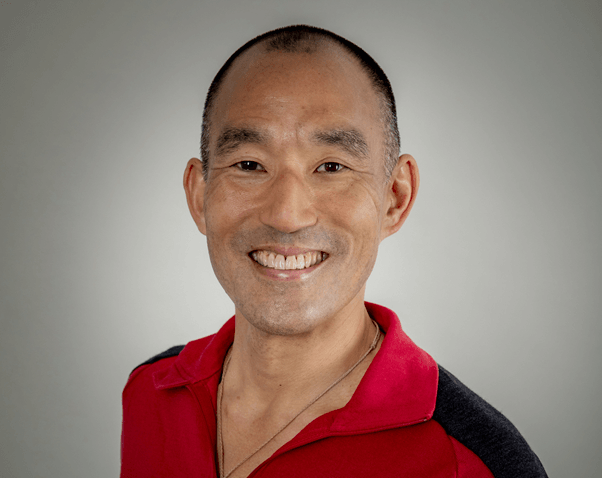Dr Gen Numaguchi
Clinical Psychologist
Gen Numaguchi Bio for ComposurePsychology:
Hi, I am a Japanese-American-Kiwi (collecting citizenships) clinical psychologist living in beautiful New Zealand, where I have been for the past 11 years with my wife and 2 teenagers (a girl and a boy). Before moving to New Zealand, I obtained Ph.D. from the University of Utah in the United States, and I have worked mostly in community mental health settings for over 20 years.

I am a member of the Motivational Interviewing Network of Trainers (MINT) and currently serve as the secretary on the MINT Oceania Board. I specialise in the areas of depression/anxiety management, personality disorders, psychopharmacology, Asian population, substance abuse, and effects of exercising in mental wellbeing.
Aside from work, I play trumpet semi-professionally and have done so for over 30 years. I am currently involved with several bands including Queenstown Jazz Orchestra as its musical director, QFO Experiment Funk Band, a Jazz Duet with a guitar player, and any other gigs that come to town and need a trumpet player. I also enjoy road/mountain biking, hiking, tramping, and doing just about anything outdoors.
Experience:
Most of my professional training and certifications have been completed in the United States, as well as my education. I was exposed to the most serious and severe cases of mental illness from the beginning of my career, which I believe helped me develop self-care, coping mechanisms and resilience early on. Some of those placements include psychiatric hospitals in New York, community mental health units, a sexual abuse treatment centre, rape crisis centre, and a methadone clinic in Salt Lake City, Utah. I was also the Clinic Director at a community mental health clinic in Moab, Utah, where I took on the challenges of starting several drug court programmes from scratch and working closely with the criminal justice system.
Serendipitously, after moving to Queenstown, New Zealand, I have had opportunities to work with Japanese clients while working in a community mental health clinic. While it was somewhat difficult at first, I soon developed a niche and the necessary skills to provide effective therapy in Japanese, both from a language perspective and a cultural one.
I left the public sector two years ago to work for an ACC contract company, with whom I am currently employed. The position involves completely different aspects of psychology compared to what I had done the previous 30 years of my career. Now I deal with pain management, concussion, traumatic brain injury (TBI), and mental injury assessments.
Models and Mediums of Treatment:
While I would describe my therapeutic approach as eclectic and adapting to the needs of the client, I mainly incorporate Motivational Interviewing (MI), Cognitive Behavioural Therapy (CBT), Psychodynamic/Social Learning Model, and Mindfulness into my practice.
Qualifications and Memberships:
Registered Clinical & Counselling Psychologist - New Zealand Psychologists Board
Licensed Psychologist (Utah #: 262505-2501)
New Zealand Psychological Society (Member #: 5013)
MINT (Motivational Interviewing Network of Trainers since 2014)
MINT Certified Trainer
MINT Oceania – Board Member; Secretary (2021)
American Psychological Association (Member #: 6809-2209) – non-active
National Association of Drug Court Professionals
Psy Chi - National Honour Society in psychology
Southern DHB DAO (Duly Authorized Officer) (Active since 2011)
Native Japanese Speaker
CPR/First Aid
Certified JIREH Trainer – Physical Restraint and Self-Defence
State of Utah Designated Mental Health Examiner
State of Utah Certified Crisis Counsellor
Summary:
I am a highly experienced clinical psychologist based in New Zealand who is capable of providing comprehensive, deeply interpersonal psychological treatment in English and Japanese with a full understanding of multiple cultures beyond languages.
Publications:
Numaguchi, G. (2019). Why are we hiding behind closed doors? Pros and Cons to recording therapy sessions. Psychology Aotearoa, 11 (1), 11-13.
Numaguchi, G. (2014). Implementation of drug court programmes and possibilities in New Zealand. Psychology Aotearoa, 6 (1), 25-29.
Numaguchi, G., Hill, R. D., Kircher, J. C., & Allen, S. N. (2002). The effectiveness of the Penn Inventory for predicting posttraumatic stress disorder symptomatology in a female population. Traumatology, 8 (2), 51-60.
Numaguchi, G., Kircher, J. C., Craig, R. A., Raskin, D. C., Woltz, D. J., & Packard, R. E. (1994). The Erlanger method for measuring cardiovascular activity: Correlations with blood volume and arterial pressure. Psychophysiology, 31, S73-S74.
Presentations (Condensed):
2021 MI and Pain Management
2020 Conversation Café: Cultural Differences in MI World
2020 Hikikomori – International Phenomenon
2020 Basic Mental Health and Mental Wellbeing
2019 Basic Mental Health and Related Illnesses
2019 Why Are We Hiding Behind Closed Doors? Pros and Cons of Recording Therapy Sessions
2019 Motivational Interviewing – Basic Concepts
2019 Advanced Motivational Interviewing Clinical Skills and Co-Existing Problems
2018 MI Spirit Demonstration and Rapid Reflections
2018 MINT Trainer Certification Experience
2017 Fear and Empathy (Mini-Workshop)
2017 Fear and Empathy: Using MI Skills to Bring Us Closer (Mini-Workshop)
2016 Writing Comprehensive Assessments using Motivational Interviewing Techniques
2016 Co-Existing Problems
2015 Exercise and Mental Health
2014 Psychosomatic Symptoms in Asian Population: More than a headache?
2014 Implementation of Drug Court Programmes and Possibilities in New Zealand
Keynote Speaker – Community Anglican Church Workshop (Balclutha, NZ)
2013 Street Drugs
Clinical Psychologist fluent in Japanese able to support people in Asia, Australia and New Zealand.
Please contact me at ComposurePsychology
info@composurepsychology.com
with FOR GEN in the subject line
or telephone +44 (0) 333 800 3454
to book a session or for a free brief chat
about how we might work together.